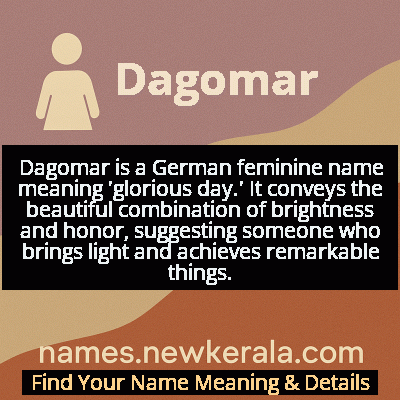Dagomar Name Meaning & Details
Origin, Popularity, Numerology Analysis & Name Meaning of Dagomar
Discover the origin, meaning, and cultural significance of the name DAGOMAR. Delve into its historical roots and explore the lasting impact it has had on communities and traditions.
Name
Dagomar
Gender
Female
Origin
German
Lucky Number
5
Meaning of the Name - Dagomar
Dagomar is a German feminine name meaning 'glorious day.' It conveys the beautiful combination of brightness and honor, suggesting someone who brings light and achieves remarkable things.
Dagomar - Complete Numerology Analysis
Your Numerology Number
Based on Pythagorean Numerology System
Ruling Planet
Mercury
Positive Nature
Adventurous, dynamic, curious, and social.
Negative Traits
Restless, impatient, inconsistent, prone to indulgence.
Lucky Colours
Green, white.
Lucky Days
Wednesday.
Lucky Stones
Emerald.
Harmony Numbers
1, 3, 9.
Best Suited Professions
Sales, marketing, travel, entertainment.
What People Like About You
Versatility, charisma, adventurous spirit.
Famous People Named Dagomar
Dagomar of Austrasia
Frankish Noblewoman
Member of Merovingian royalty, known for diplomatic influence during Frankish consolidation
Dagomar von Bayern
Bavarian Aristocrat
Noblewoman who played key role in Bavarian-Frankish relations during Carolingian era
Dagomar Schmidt
Historical Researcher
Scholar specializing in Germanic name studies and medieval women's history
Name Variations & International Equivalents
Click on blue names to explore their detailed meanings. Gray names with will be available soon.
Cultural & Historical Significance
Throughout Germanic history, Dagomar represented more than just personal identity—it embodied cultural values of honor, brightness, and renown. The name's usage among aristocratic families indicated status and the expectation of notable achievements. In medieval Germanic societies, names containing 'dag' elements were often given to children born at significant times or to express parental hopes for a luminous, successful life. The feminine form Dagomar, while less common than masculine variants, maintained this tradition of aspirational naming among noble households.
Extended Personality Analysis
Individuals named Dagomar are typically perceived as radiant, charismatic personalities who bring light and energy to their surroundings. They often exhibit natural leadership qualities combined with a warm, approachable demeanor that inspires confidence in others. Their 'glorious day' namesake manifests in optimistic outlooks, resilience during challenges, and an ability to find silver linings in difficult situations. These women tend to be forward-thinking, with a natural talent for planning and organization that helps them turn visions into reality.
Dagomar's personality often balances traditional values with modern adaptability, making them effective in both conservative and progressive environments. They possess strong communication skills and emotional intelligence, allowing them to navigate complex social dynamics with grace. Their inherent brightness makes them natural motivators and mentors, while their sense of honor ensures they maintain integrity in all endeavors. The combination of day symbolism with glory suggests individuals who not only shine themselves but also illuminate paths for others to follow.
Modern Usage & Popularity
In contemporary times, Dagomar remains a rare but culturally significant choice, primarily used in German-speaking regions and among families with strong Germanic heritage. The name has seen a modest revival in recent decades as part of the broader trend toward historical and meaningful names. While not appearing on mainstream popularity charts, it maintains a niche following among parents seeking unique names with deep cultural roots and positive meanings. Modern usage often involves combining Dagomar with more contemporary middle names to balance tradition with modernity, and it's occasionally chosen by families interested in medieval reenactment or Germanic cultural preservation.
Symbolic & Spiritual Meanings
Symbolically, Dagomar represents the triumph of light over darkness, new beginnings, and the promise of achievement. The 'day' element connects to concepts of clarity, truth, and enlightenment, while 'glory' symbolizes honor, recognition, and lasting impact. This combination creates a powerful metaphor for personal growth and societal contribution—suggesting an individual who brings illumination to complex situations and earns respect through honorable actions. The name embodies the cyclical nature of success, where each new 'day' offers fresh opportunities for glory and the continuous pursuit of excellence in one's endeavors.

